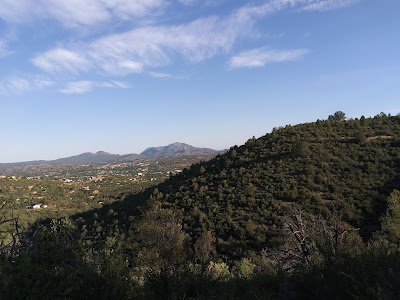it was shady on the west face of Badger Mountain this morning. the inward corners between each ridge were especially cool. at the crests of each ridge I could look back north to see the whole town like a set of toy models, framed just so by Thumb Butte and Granite Mountain.
snippets of songs and past conversations and poems-to-be and a whole bunch of other ideas sewed themselves through my thoughts as I climbed.
how to describe the sensation of one's body breaking spiderwebs. birds--I think it's a female bluejay but I'm not sure.
layers and layers of pine-scented Saturday. the striking, heavy-feeling color of smooth, dry, grey-white, dead trees.
oh how lovely was the morning. but what if there's no way of
telling how virtuous or good-intentioned any historical figure truly
was?
thinking of the outdoors as sacred. mountains and high places as extra sacred. the striking, smooth, dry, white-grey color of what once was a tree now feels like a symbol. persistence. potency.
I give myself permission. or I take permission from the air and the sunshine like a plant takes oxygen and energy. permission to decide for myself and say what I want.
and what was the name of that book about forests? How Forests Think, by Eduardo Kohn. we read it for Thomas Rickert's class, almost five years ago. the most memorable thing about it to me now is the story the author tells about seeing a bird near a river and being suddenly, beautifully, drawn out of himself and his troubles.
conincidentally when I sat down to blog for today I found in one of my old drafts a copy of a paper I wrote for that class, mainly drawing on Kohn's book. much of the paper is semi-cringy, flippant grad school pretentiousness, connecting what Kohn writes with my own thoughts about food and food media. but even so, some of it might be worth remixing here.
it starts with food and eating, but then goes beyond that into where all the food comes from.
James Gibson writes that “The possibilities of the environment
and the way of life of the animal go together inseparably” (p. 143). my
own management of eco-assemblages is pretty indirect these days, unless
I’m home digging in my dad’s garden. as a non-hunting, non-fishing
academic person, I take advantage of grocery stores and farmers' markets full of already-managed things to cook and
eat—things that I will probably never need to learn to procure from the earth or the sea for myself. maybe that means my involvement with ecosystems is less intimate, but
maybe not. the groceries I buy and cook and eat still matter, not only
to my body and my kitchen but to the world I am a part of. every
purchase makes marks and leaves traces in a hundred directions. the
infrastructures that support grocery stores afford certain
possibilities, and those are inseparable from my way of life, so far.
we could make a long
list of specific ways non-human lives support our dietary habits.
Ingold makes note of this mutual support in a broader way:
“Moreover, granted that not all producers are human, it is easy to turn the argument around and show how various non-humans contribute, in specific environments, not just to their own growth and development but also to that of human beings. … living beings of all kinds, in what they do, constitute each other’s conditions of existence, both for their own and for subsequent generations” (Ingold, p. 8).
A line before this lovely
acknowledgement, Ingold writes rather simply (even naively?
nostalgically?) that “The farmer’s work on the fields, for example,
creates favourable conditions for the growth of crop plants, and the
herdsman’s does the same for domestic animals” (8).
doesn't that just sound so
symbiotic and peaceful. idyllic, even. but how exactly do we define favorable? whose favor are
we most concerned about? Gibson’s observations on how much humans muck
around with what our environments afford reinforce this tragic mess: “In
making life easier for himself, of course, he has made life harder for
most of the other animals” (p. 130). we don’t think about this very deeply
very often. often we sometimes actively avoid thinking about it.
what one does or does not put into one’s body makes marks. dietary
strictures may be religious, political, ethnic, personal,
health-related, or any combination. the forbidden substances seem to
make the deepest, most obvious marks: no dairy, no carbs, no pork, no
coffee, no alcohol, because this is who we are.
or is it the other way
around—this is who we are, because we can’t eat gluten or we won’t eat
meat or we’d rather not support Chick-fil-A?
either way, as Ingold pulls
from Marx and José Ortega, “what we are, or what we can be, does not
come ready made. We have, perpetually and never-endingly, to be making
ourselves” (p. 7). and for Thompson, these processes are about “I-ing,” but it seems just
as important to think about “we-ing.” It matters who/what we tend to
include in “we” and who/what we do not. our human management of
eco-assemblages (and maybe of everything else) has been too shortsightedly
human-centric for too long.
and then the paper quotes from Roy Scranton's “Learning How to Die in the Anthropocene,” and I question his rhetorical dichotomization of nations and markets vs. "our sense of what it means to be human."
it's not so separable, I say.
organisms and their environments can’t really live without each other. it's too connected.
none of us can deny our intimate interactions with
things we eat, even if we don’t think about them very deeply all the
time. even if we actively avoid thinking about them.
{ apologies for my incomplete citations throughout this refurbished text. if I get a chance I'll update them here to specify titles and other info that was taken for granted when I wrote this for Posthumanism in 2014. }






No comments:
Post a Comment